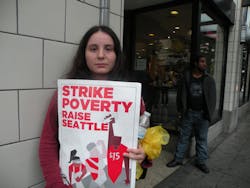Oct. 27--SEATAC -- Clipboard in hand, union activist Abdirahman "Abdi" Abdullahi walks from apartment to apartment urging SeaTac's large immigrant communities to vote yes on Proposition 1.
Abdullahi, an affable Somali refugee who speaks three languages and lives in SeaTac with his wife and two young children, was hired by the pro-Prop. 1 campaign to make the case for a $15-an-hour "living wage." He is on leave from Hertz, where he earns $11.20 an hour and gets no paid sick time.
"I want to help everyone at the airport," said Abdullahi, 32, now a U.S. citizen. "It's a hard life."
SeaTac is the latest battleground in a national debate over the plight of low-wage workers and government's role in boosting labor standards. With possible reverberations nationwide, the campaign has attracted hundreds of thousands of dollars from powerful business groups and unions.
The Nov. 5 ballot initiative would raise the wage floor to $15 an hour for thousands of hospitality and transportation workers at Seattle-Tacoma International Airport and its nearby hotels, car-rental agencies and parking lots.
Prop. 1 also would require airport-related businesses to provide paid sick leave, offer part-time workers more hours before hiring additional part-timers and retain employees for at least three months after an ownership change.
Abdullahi's counterpart on the other side of the Prop. 1 campaign is Jac Cates, an athletic, ruddy-faced extrovert who roams SeaTac's more affluent neighborhoods of single-family homes with an iPad Mini and a mobile-canvassing app called Ground Game.
"The people who own the homes are decidedly against it," said Cates, 45, who was hired by a consulting firm for Common Sense SeaTac, a business-backed political committee opposed to Prop. 1. "They understand that the administrative costs of having to enforce it will fall on property owners."
Prop. 1 comes as President Obama calls for rebuilding middle-class jobs, and fast-food workers try to get major chains like McDonald's to pay a $15 hourly minimum rate.
Proponents of the SeaTac measure say it would lift low-wage workers out of poverty, give them more money to spend at local businesses and strengthen the economy. Opponents say it would force businesses to raise prices or cut staff, and would leave taxpayers footing the bill for enforcement costs.
Both sides have inundated SeaTac, a city of only 10 square miles, with door-to-door canvassers, phone calls, cable TV ads, yard signs and direct-mail fliers.
"Voters in SeaTac know this is an important decision," said Gary Smith, spokesman for Common Sense SeaTac. "They feel a little like they're in Iowa or New Hampshire during the presidential primaries."
Campaign spending
Supporters and opponents of Prop. 1 have spent a combined $1.1?million in a city of only 12,100 registered voters. That's a whopping $94 per voter, and the battle is far from over.
By comparison, said Western Washington University political-science professor Todd Donovan, an expert on ballot measures, the 2011 initiative to privatize Washington state's liquor sales cost both sides a then-record $17 for each vote cast.
Based on a projected voter turnout of 55 percent in King County, if both sides of Prop. 1 spend all their money, the campaign could end up costing a combined $238 per vote.
Common Sense SeaTac has raised $644,698, according to reports filed by Friday with the Public Disclosure Commission.
Alaska Airlines, based in SeaTac, gave about $160,000. Other contributors include state and national trade groups representing car-rental agencies, hotels and restaurants.
Supporters of Prop. 1, organized as Yes! for SeaTac, have raised $941,065 in cash and in-kind contributions.
Minimum wage
Washington's minimum wage, at $9.19 an hour, is already the highest of any state and will rise to $9.32 on Jan. 1 after an inflation adjustment.
Union leaders say a proliferation of low-paying jobs over the past decade has put hourly wages in the national spotlight.
Industries that pay below the national average have added 4.4 million jobs since early 2010. That's about 43 percent more than industries with above-average wages, according to a recent Wells Fargo report.
Wages in the lowest-paying industries also have not kept up with inflation, the report said.
President Obama now is pushing for a hike in the federal minimum wage to $9 an hour from $7.25, and momentum appears to be building at the state and local level.
California lawmakers last month committed to boost the state's hourly minimum standard from $8 to $10 by 2016.
In Albuquerque, N.M., and Long Beach, Calif., voters last November raised local wage floors.
And in Seattle, both mayoral candidates have pledged their support for creating a citywide minimum rate of $15 an hour.
It's part of a broader effort by organized labor to reinvent itself and reverse a decades-long decline in union membership: Among the hot-button issues in SeaTac is a provision that allows Prop. 1 to be waived in a union contract.
David Rolf, president of the Service Employees International Union's (SEIU) Seattle-based Healthcare 775 NW local and an SEIU international vice president, called the ballot measure "one tool in our toolbox" to narrow the widening income gap between rich and poor.
"In a different era, this would have been solved through strikes and collective bargaining. Now it's being solved, hopefully, at the ballot box," he said. "It wouldn't surprise me if this happens in other places."
City ordinances
Proponents, citing federal food-stamp guidelines, say $15 an hour, plus annual increases tied to inflation, is what a family of three needs to get by without public assistance.
More than 120 cities nationwide have enacted living-wage ordinances since the 1990s, mostly covering government workers and contractors, according to the National Employment Law Project (NELP).
The idea behind many living-wage ordinances is that employers benefiting from public contracts or tax subsidies should pay their workers a more livable wage than state and federal minimums, said NELP program director Paul Sonn.
Four major California airports already require their tenants to pay above-minimum wages. At the Los Angeles airport, workers are guaranteed an hourly minimum of $10.91, or $15.67 without health benefits. Workers at the San Jose airport make at least $13.82 with health benefits, or otherwise $15.07.
Ken Jacobs, chairman of the Center for Labor Research and Education at the University of California Berkeley, said those rules have had few, if any, negative effects on employment and prices. On the contrary, he said, they helped reduce employee turnover and improve customer service.
"If you raise the minimum wage to $15 an hour, 64 percent of the people in the country would make more money. And the idea that it would destroy the economy is crazy," said Seattle venture capitalist Nick Hanauer, who along with his wife, Leslie, gave $25,000 to support Prop. 1. "Raising the bottom in a balanced way will generate prosperity for everyone."
Airline's opposition
To some extent, Prop. 1 can be seen as payback for Alaska Airlines' decision in 2005 to outsource ramp work done by the Machinists union to Menzies Aviation. At the time, Alaska employees who lost their jobs earned an average of $13.41 an hour.
Puget Sound Sage, a coalition of labor, religious and community groups, estimates that employees of airline contractors and cargo handlers at Sea-Tac currently make an average of $9.95 an hour.
Prop. 1 exempts airlines, but not airport vendors, which provide Alaska's cabin cleaners, curbside porters, ramp workers, re-fuelers and wheelchair escorts. Alaska has warned that wage increases would be passed along to customers through higher ticket prices.
The company also has raised the possibility of a legal challenge if Prop. 1 passes.
"There is an issue in our country around wage inequality. How you get to a solution is complicated," said Keith Loveless, general counsel and executive vice president at Alaska Air Group. "But I'm pretty sure the answer is not having folks who clean out our cabins make as much money as a first- or second-year teacher in the city of SeaTac."
Airport-food concessionaire LeeAnn Subelbia, who is featured in a cable TV ad by Common Sense SeaTac, said Prop. 1 would make her less likely to take a chance on inexperienced workers.
Subelbia employs about 50 people as owner of the airport's Great American Bagel Bakery and Big Foot Food and Spirits.
"Our (profit) margins are small, and when you talk about a 63 percent increase in the minimum wage, that's very challenging," she said.
Cates and a colleague, while canvassing a neighborhood near Angle Lake recently for votes against Prop. 1, struck up a conversation with SeaTac residents Mike and Sharon Everts. Across the street, a couple of Yes! for SeaTac signs had been planted in the ground.
Mike Everts, who sells construction equipment, said he opposes any increase in the minimum wage.
"Where does the government get off telling a business owner what he should pay someone?" Everts said.
Abdullahi, for his part, stood at the door of Debrawork Tuffa, a young mother who lives in an apartment complex off South 154th Street.
Tuffa already had signed a pledge card to support Prop. 1, and now Abdullahi hoped to secure her husband's signature. But he was not yet home from work, and Abdullahi promised to return.
Tuffa, whose husband works at an assisted-living facility, seemed happy to help.
"They're working hard," she said of the estimated 6,300 workers covered by Prop. 1. "They need more money to live. Everything's expensive."
Amy Martinez: 206-464-2923 or [email protected]. On Twitter: @amyemartinez
Copyright 2013 - The Seattle Times




